
- 1: Use interactive quizzes and games
- 2: Encourage multimedia submissions
- 3: Try project-based homework
- 4: Assign real-life tasks
- 5: Create their own revision materials
- 6: Flip the classroom with preview tasks
- 7: Wider reading / listening / watching
- 8: Research tasks
- 9: Journaling, blogging, or vlogging
- 10: Use pre-made workbooks
- Summary
- Looking for more engaging online ESL teaching materials?
- Frequently Asked Questions (FAQs)
Struggling to get your students to do their homework in online ESL classes? You’re not alone! For many online teachers, homework can feel like a constant battle – either students don’t want to do it, or parents expect mountains of it, leaving you buried in worksheet prep and feedback.
But it doesn’t have to be that way.
Whether you’re teaching young learners or teens, group classes or one-on-ones, the right kind of homework can:
- Keep students engaged between lessons
- Reinforce what they’ve learned
- Prepare students for the next class
- And save you time on prep and marking
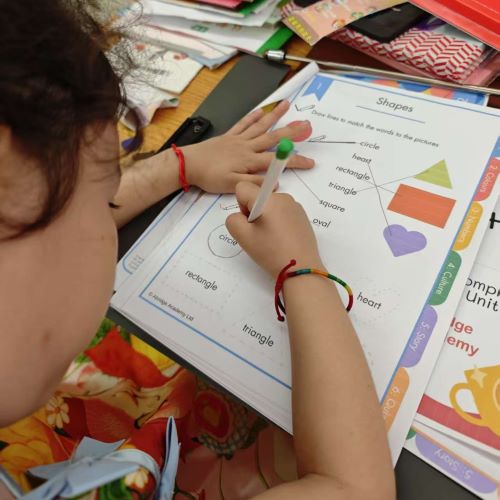
Homework is definitely a big part of their lesson structure. It reinforces memory and encourages them to think about the lesson taken.
💭 If you’re wondering…
- How can I make homework more fun and engaging for ESL students?
- How do I ensure homework is actually effective?
- How can I reduce my workload as an online teacher?
Then this post is for you.
Here are 10 low-prep, creative, and effective homework ideas you can start using in your online ESL classes today, along with insights from real teachers like you.
1: Use interactive quizzes and games
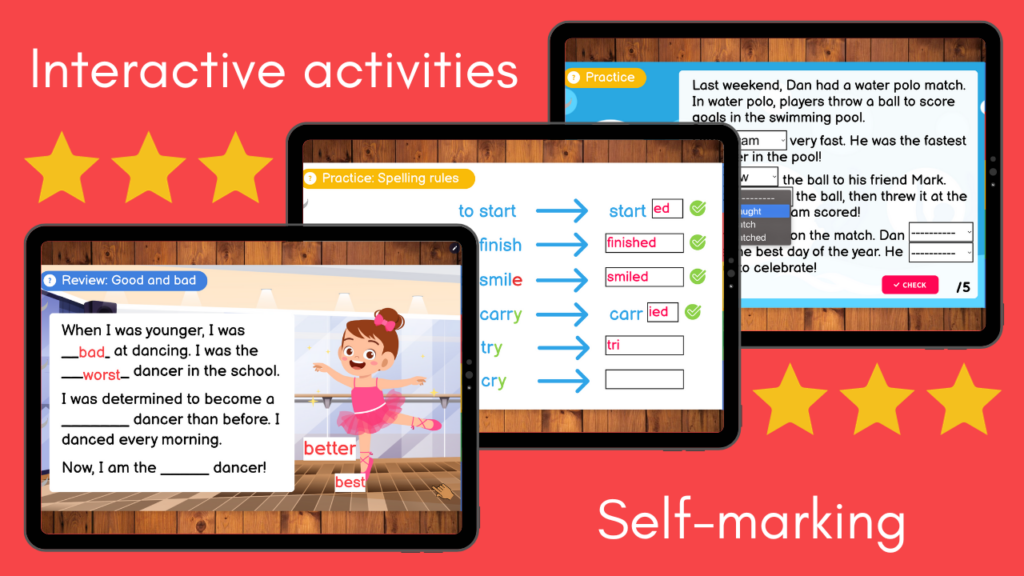
Websites such as WordWall allow you to easily and quickly create automated quizzes and games directly linked to the vocabulary, grammar, or functional language your students are practicing in class. These kind of interactive quizzes have been proven to improve language acquisition and retention.1 Plus they’re fun, fast, and offer instant feedback – and the leaderboard adds a competitive twist!
If you are an Abridge Academy curriculum member, check out the “downloads and links” section under each lesson, which often includes links to pre-made WordWall activities you can share with your students.
💡 Tip: Shout out the top scorers at the start of the next lesson to boost motivation.
Interactive options are great for kids. [Automated feedback] is so convenient, such a time-saver for teachers!
2: Encourage multimedia submissions
Instead of written tasks, ask students to send a quick voice note or short video via a messaging app.
This is perfect for pronunciation, storytelling, roleplays, or debate lessons.
Bonus points if it’s in a class group chat, prompting follow-on discussions between students!
To reduce your workload planning and creating homework tasks, this multimedia task could simply be a one or two sentence instruction, along with a screenshot of the relevant part of the lesson (e.g. the dialogue or sentence structure you want them to base their submission on).
🎤 Example: “Record one argument for or against the debate topic, including a conditional sentence.”
I ask students to record themselves repeating the example dialogue for homework. It’s really helped my students focus on clearly pronouncing new words, thinking about word stress and pitch, and improving spoken fluency. Plus they feel more confident then adapting these sentences in their own roleplay conversations during class.
3: Try project-based homework
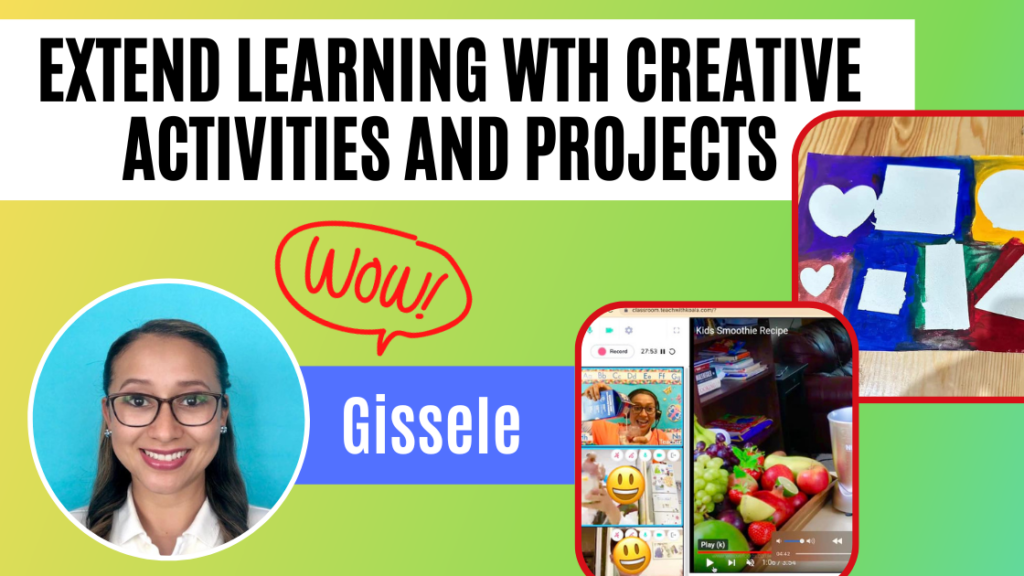
Wrap up a unit with a mini project, such as designing a travel brochure, creating a comic strip, or making a poster in English. This helps engage their creativity, while also providing a real-life application for the language they have been learning in class.
If you teach group classes, consider assigning pair homework, so they have a partner to collaborate with on these projects. Students could also share their projects with a short presentation at the start of the next lesson (great for peer feedback) or in the class group chat.
📌 Tip: Abridge Academy’s end-of-unit projects (included at the end of each workbook) make this super easy to implement!
The word “project” automatically sounds more fun than “homework”, so my students are more likely to do it. After doing the new Abridge Academy story lessons, my students wanted to create their own fairy tales. I provided a rough direction or format to follow, but kept it flexible for students to submit their work in their chosen format (video, storyboard, written, etc) to give them other ways to be creative.
4: Assign real-life tasks
The main goal of our students is to be able to use English in real-life contexts – so set that as their homework task!
Examples include:
- Go to a local café and order a drink and snack in English.
- Record a video of you interviewing your parents about their jobs.
- Visit a local museum and read about the exhibits in English.
- Message a travel agent, asking them for advice on places to visit.
- Cook a meal following instructions in English.

💡 Tip: Ask students to prepare some evidence of their task completion and encourage them to discuss their experience in the next class.
5: Create their own revision materials
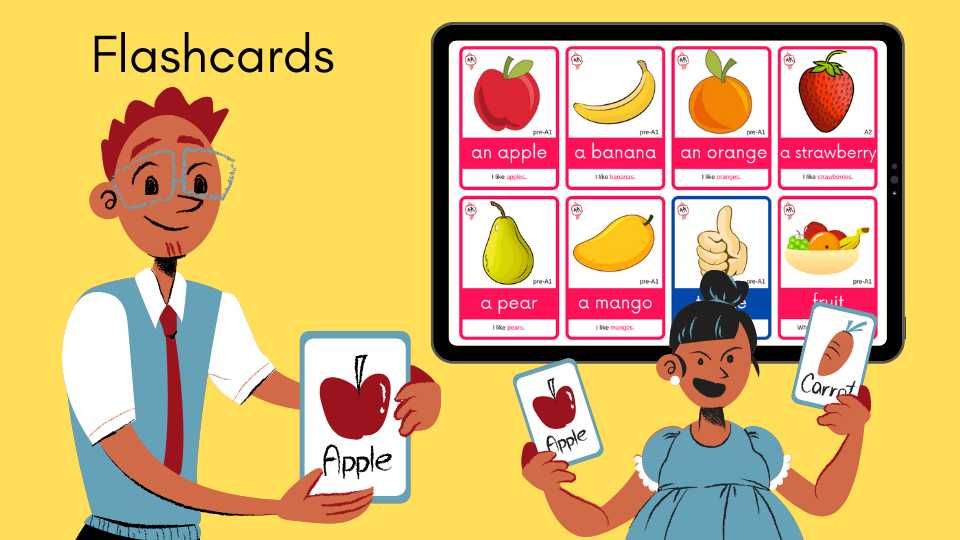
Continual review is essential to language learning success! Of course, you can provide students with useful revision materials such as vocabulary flashcards (included in the Abridge Academy curriculum). However, research shows that making their own resources is actually more effective2 – the process of consolidating and organising key ideas is in itself an important learning opportunity.
Here are some suggestions you could ask students to try:
- Add new words to their vocabulary bank, using physical flashcards or spaced repetition apps such as Anki.
- Make a poster summarising the new grammar point, including three example sentences.
- Label a diagram with the key words, to add to your notebook.
- Create a mind map summarising useful phrases for different restaurant-based conversations.
Useful tools
6: Flip the classroom with preview tasks
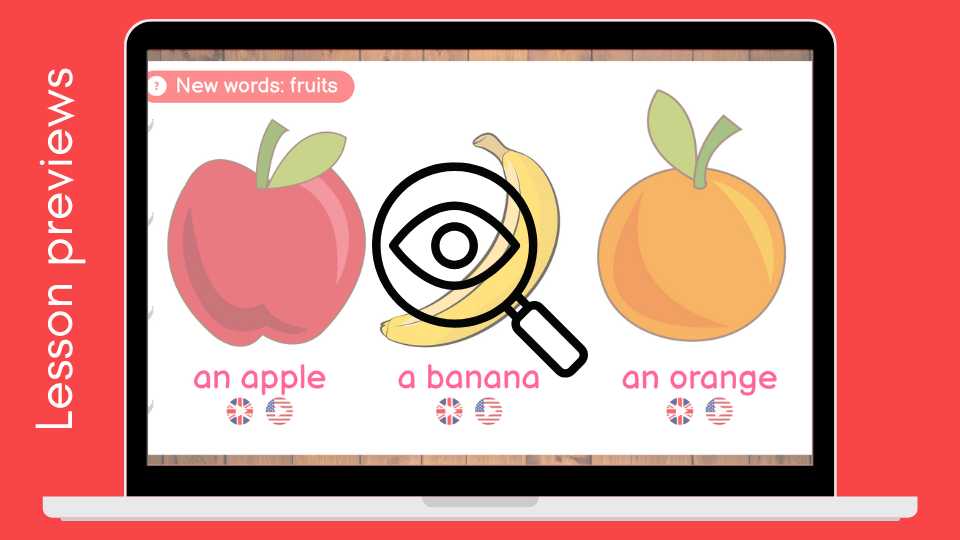
Flipped learning is an increasingly popular teaching approach, particularly among online teachers with teenage or older students. Instead of post-lesson homework, assign short preview activities for students to pre-learn key ideas before class. This ensures that students come to class prepared, and has been proven to boost language proficiency, knowledge and skills.3
The Abridge Academy curriculum lessons already include slide previews, including audio for new vocabulary and example sentences, interactive tasks, and more. You can also encourage students to draw a mind map, add to their vocabulary banks, or prepare their own ideas for discussion questions to keep this pre-learning active and focused.
📚 Bonus: You’ll spend less time explaining basic concepts during class, and more time on active language use.
The lesson previews is what my parents consider to be homework because they find them more interactive and independent for their kids to use. Super interesting, and then we usually do the workbooks in class (as a review before each new lesson).

7: Wider reading / listening / watching
Homework doesn’t have to be boring exercises! While active language use and practice is important, more passive exposure to natural language is also valuable for broadening vocabulary, experiencing authentic language use, and developing a genuine enjoyment of English.
Look up books, online articles, movies, short videos, podcasts, music, etc relating to the topic you are focusing on in class and recommend these to your students. If you want them to focus on specific language skills, you could assign more active tasks for them to complete, such as noting down five new words with their definitions, writing a short summary, or preparing a review of the book / movie.
Useful tools and websites
YouTube channels: SuperSimpleSongs, English SingSing, EasyEnglishPractice, Pocket Passport
Bilingual subtitling and language learning tool: Language Reactor
Written articles adapted for ESL learners: Breaking News English, News in Levels, British Council Magazine Zone
8: Research tasks
In preparation for a debate or more in-depth discussion-focused lesson, ask students to research key points, evidence, data, or examples before the class.
This not only develops independent research skills, but also sets them up to create more powerful arguments during the class debate.
You could provide them with some quick search prompts or useful websites / articles to assist with this, or leave it more open-ended.
This isn’t just for advanced debating or speaking lessons either – you could also encourage students to research local cultural insights (e.g. famous food, places to visit, popular events and festivals, etc) for related lesson discussions.
9: Journaling, blogging, or vlogging
We all know that regular practice is important for language development! An easy, zero-prep homework activity your students can work on every week is to write or record a diary entry about interesting events. This not only consolidates topics such as daily activities, places, food, hobbies, etc but also develops structured language use and can prompt them to look up additional vocabulary relating to their personal interests.
This record could be in a variety of formats, including:
- Diary entry
- Blog article (consider setting up a class blog to share these too!)
- Vlog (video blog)
- Social media post
- Podcast / audio recording
- Postcard or letter

My students publish on my blog and then other students read what they have written within my lessons. As my students read the work of others within their grade, they are inspired and excited to produce their own best work.
10: Use pre-made workbooks
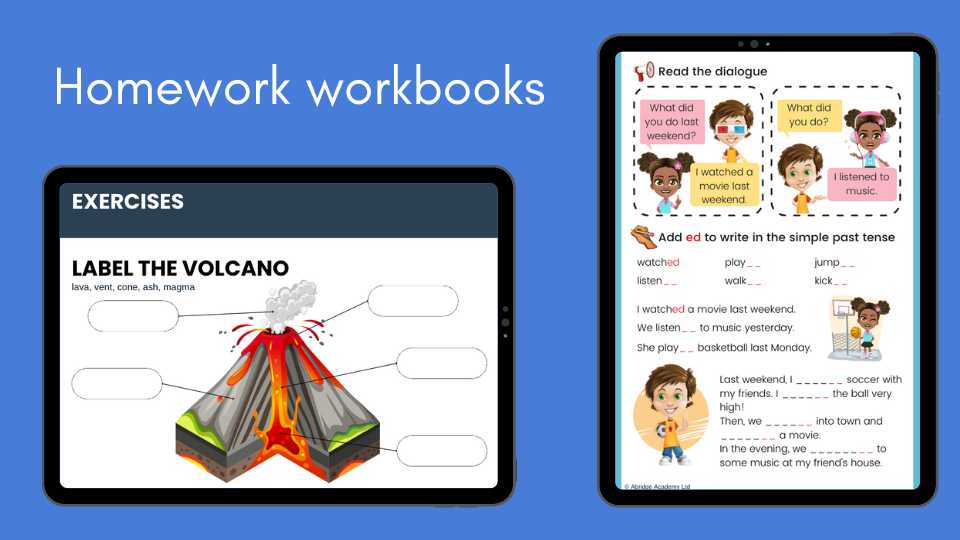
If you’re looking for more traditional homework assignments, the Abridge Academy curriculum includes pre-made workbooks and worksheets to accompany the lessons. There’s no need to create them from scratch yourself! Simply download the PDF files then send to your students via a messaging app or your teaching platform’s homework assignment system, or upload to a website such as Live Worksheets for digital submissions.
The parents love that there is homework for the students to do. It has made life much easier!
Workbooks typically focus on core vocabulary, grammar, and writing tasks. This is particularly helpful for students who are preparing for exams or academic use of English, as well as giving them the opportunity to review and consolidate learning between classes. And if your students don’t want to do the workbooks at home, you can also use them as extension activities during class time too!
The new workbooks are amazing! My parents like that they are printable as many of them are concerned about their eyesight and screen time. The workbooks also help students with their handwriting practice too. Thank you for the resources you provide, they are fabulous
Summary
Homework doesn’t have to be boring, stressful, or time-consuming for you or your students. By thinking outside the box and embracing creative, low-prep options like interactive quizzes, multimedia tasks, and real-world projects, you can:
- Boost student engagement between lessons
- Reinforce learning in fun, meaningful ways
- Reduce your prep and marking workload
- Show parents the real value of your classes
Whether you’re using Abridge Academy’s ready-to-go resources or trying out some of the fresh ideas shared here, remember: the most effective homework is purposeful, practical, and personalised to your students’ interests and goals.
✨ Try one or two ideas this week — and see what works best for your learners!

Looking for more engaging online ESL teaching materials?
The Abridge Academy lessons are super interactive, with plenty of activities and games to keep your learners engaged in class. Our structured step-by-step curriculum covers all language areas, while supplementary courses (such as debating, phonics, stories, topical reading, and academic writing) provide more focused extended practice.
🎁 FREE Placement test, trial classes, and student onboarding materials.
✅ Super interactive and engaging lessons, specifically designed for online learning.
✅ Zero prep – includes lesson slides, homework workbooks, supplementary activities, flashcards, lesson previews, and more.
✅ Suitable for beginner to advanced students (CEFR levels A1-C1), particularly kids and teens.
References
- https://www.researchgate.net/publication/384874093_IMPROVING_STUDENTS’_VOCABULARY_THROUGH_WORDWALL_APPLICATION ↩︎
- https://sc-pan.github.io/pdf/PZIZQ_2022.pdf ↩︎
- https://www.researchgate.net/publication/387290222_The_Effectiveness_of_Flipped_Classroom_in_English_Language_Learning_A_Meta-Analysis ↩︎
